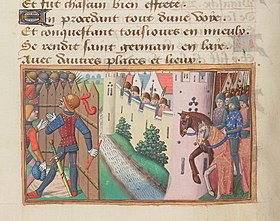Siege of Calais (1436): Difference between revisions
←Created page with 'The '''siege of Calais''' between June and July 1436 was a failed siege of English-held Calais by Philip the Good, Duke of Burgundy and Flemish m...' |
No edit summary |
||
| Line 1: | Line 1: | ||
[[File:Vigiles de Charles VII, fol. 90v, Siège de Calais (1436).jpg|thumb|right|Siege of Calais (1436)|280px]] |
|||
The '''siege of Calais''' between June and July [[1436]] was a failed siege of English-held [[Calais]] by [[Philip the Good]], [[Duke of Burgundy]] and Flemish militia. |
The '''siege of Calais''' between June and July [[1436]] was a failed siege of English-held [[Calais]] by [[Philip the Good]], [[Duke of Burgundy]] and Flemish militia. |
||
| Line 16: | Line 18: | ||
==Aftermath== |
==Aftermath== |
||
The sailed siege was a humilating defeat for the Duke. |
The sailed siege was a humilating defeat for the Duke. |
||
Skirmish with the English and English piracy seriously disturbed the Flemish economy in the following years. But as the English economy also depended on trade with Flanders, peace was finally concluded in 1439.<br> |
|||
Calais remained under English control until 1558. |
Calais remained under English control until 1558. |
||
| Line 30: | Line 33: | ||
* {{Translation/Ref|fr|Siège de Calais (1436)}} |
* {{Translation/Ref|fr|Siège de Calais (1436)}} |
||
== Links == |
|||
* [http://books.google.be/books?id=yIthoIVk1lgC&pg=PA210&lpg=PA210&dq=calais+1436&source=bl&ots=MJ-HHOLjCT&sig=YCOIAuOtP_qTP_VZKzwLE_ApvZk&hl=nl&sa=X&ei=1REWUZrrDIGWhQfhqIHACQ&ved=0CDUQ6AEwADgK#v=onepage&q=1436&f=false The Calais Garrison War and Military Service in England, 1436-1558, David Grummitt page 20-43] |
|||
* [http://www.warsoftheroses.co.uk/chapter_30.htm Michael Moller - Wars of the Roses Chapter 30: The aftermath of the Treaty of Arras 1425: Years 1435 - 1437] |
|||
[[Category:Sieges involving England|Calais 1436]] |
[[Category:Sieges involving England|Calais 1436]] |
||
Revision as of 09:12, 9 February 2013

The siege of Calais between June and July 1436 was a failed siege of English-held Calais by Philip the Good, Duke of Burgundy and Flemish militia.
Prelude
England and Burgundy had been allies against France in the Hundred Years' War since 1415.
But when the English walked out of peace talks during the Congress of Arras in 1435, the Duke of Burgundy stayed and concluded the Treaty of Arras with the French King, thus switching sides in the war. The English were outraged because of the Duke's betrayal, and the London populace was allowed the plunder possessions of Flemish, Dutch and Picard merchants in the city, all subjects of the Duke of Burgundy. There was also an incursion in the Duke's territories by an English force of 2000 men, who defeated 1500 Flemish soldiers under Jean II de Croÿ in the Boulonnais.
Philip the Good reacted by declaring war on England. In this, he was supported by the Flemish cities, who saw their trade with England menaced.
the Siege
The obvious target of the Duke was Calais. He first conquered some smaller English strongholds, like Oye castle, where he hanged part of the garrison, Sangatte and Vaucliguen. In June he started the siege of Calais, supported by large numbers of Flemish and Picard militia. In total, the Duke had some 30,000 men at his disposal. He also sent a force under Jean II de Croÿ to besiege Guînes.
The militia had been very eager to take Calais quickly, but when after a few weeks it became apparent that the city was well defended and provisoned, the enthusiasm quickly decreased. When a Dutch fleet of 5 to 6 ships under Jan of Hornes failed to block the harbor of Calais, the Flemish army started to disintegrate.
When a English relief army of some 10,000 men under Humphrey of Lancaster, 1st Duke of Gloucester approached, the Duke of Burgundy had no option but to raise the sieges of Calais and Guînes and withdraw.
Aftermath
The sailed siege was a humilating defeat for the Duke.
Skirmish with the English and English piracy seriously disturbed the Flemish economy in the following years. But as the English economy also depended on trade with Flanders, peace was finally concluded in 1439.
Calais remained under English control until 1558.
See also
- Siege of Calais (1346)
- Siege of Calais (1348)
- Siege of Calais (1558)
- Siege of Calais (1596)
- Siege of Calais (1940)
